28 mar 2013
Settlers training their children how to shoot near a Palestinian school
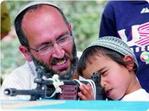
Palestinian sources said that extremist settlers trained, on Wednesday, dozens of their children to shoot using hunting rifles, near a school in the village of Nabi Samuel northwest of the occupied city of Jerusalem.
The Information Center of Wadi al-Hilweh in occupied Jerusalem quoted the headmaster Khalil Abu Arqoub as saying that the settlers have been training their children to shoot using the hunting rifles near the Nabi Samuel School, which caused a state of fear and panic among the school children.
Abu Arqoub added that "the school and the training venue were only separated by a barbed wire," adding that "the training has lasted for several hours, with the participation of nearly 40 Jewish children."
He pointed out that he had submitted a complaint to the occupation authorities which claimed that the children were playing, and did not bother to stop the training.
The Information Center of Wadi al-Hilweh noted that near the school there is a building inhabited by Jewish extremists from Kiryat Arba settlement, and that they continue to disturb the schoolchildren.
The Information Center of Wadi al-Hilweh in occupied Jerusalem quoted the headmaster Khalil Abu Arqoub as saying that the settlers have been training their children to shoot using the hunting rifles near the Nabi Samuel School, which caused a state of fear and panic among the school children.
Abu Arqoub added that "the school and the training venue were only separated by a barbed wire," adding that "the training has lasted for several hours, with the participation of nearly 40 Jewish children."
He pointed out that he had submitted a complaint to the occupation authorities which claimed that the children were playing, and did not bother to stop the training.
The Information Center of Wadi al-Hilweh noted that near the school there is a building inhabited by Jewish extremists from Kiryat Arba settlement, and that they continue to disturb the schoolchildren.
British academics delegation arrives in Gaza
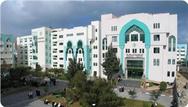
A British academics delegation arrived in the Gaza Strip on Wednesday evening, a move considered as the second of its kind. The visit is organized by Pal Link Foundation, which seeks to develop the relationships between both Palestinian and British students and academics. The delegation embraces the slogan "United by Education".
The delegation encompasses 27 members, all of whom are British academics and university students, a security source at the crossing told PIC's correspondent.
Pal Link Foundation announced that the visitors seek to check the educational situation in the Gaza Strip under the Israeli siege. They will hold workshops, and deliver training lectures for Palestinian university students.
The visit is due to last up to 9 days, during which the 27-member delegation will be making documentaries for the British university students, when going back to England.
The Foundation stressed that the visit is set to build bridges of cooperation, strengthen the bonds between British and Palestinian academics, and stress on the right of education, which is guaranteed by the international law.
The delegation is scheduled to visit Gaza’s Universities, the Palestinian refugee camps, families of detainees, Islamic & Christian sites and headquarters of international human rights organizations in the Gaza Strip.
The delegation encompasses 27 members, all of whom are British academics and university students, a security source at the crossing told PIC's correspondent.
Pal Link Foundation announced that the visitors seek to check the educational situation in the Gaza Strip under the Israeli siege. They will hold workshops, and deliver training lectures for Palestinian university students.
The visit is due to last up to 9 days, during which the 27-member delegation will be making documentaries for the British university students, when going back to England.
The Foundation stressed that the visit is set to build bridges of cooperation, strengthen the bonds between British and Palestinian academics, and stress on the right of education, which is guaranteed by the international law.
The delegation is scheduled to visit Gaza’s Universities, the Palestinian refugee camps, families of detainees, Islamic & Christian sites and headquarters of international human rights organizations in the Gaza Strip.
27 mar 2013
General strike at Universities throughout West Bank
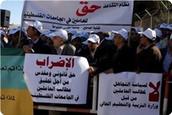
Palestinian universities closed doors on Wednesday and Thursday protesting against neglecting their employees' demands by Fayyad's government.
Dr. Amjad Barham President of Palestinian Federation of Unions of University Professors and Employees said, in press statements, that the strike will continue in all West Bank universities, threatening to escalate it during the next week in protest at the policy of Salam Fayyad's government in dealing with the Union's demands.
Fayyad's government failed until the moment in meeting the demands of the Union, Barham added, pointing out to the further escalation of the situation.
The state Universities' employees protested on Tuesday outside PA headquarters, where they handed over a letter to Salam Fayyad containing the employees' demands.
Dr. Amjad Barham President of Palestinian Federation of Unions of University Professors and Employees said, in press statements, that the strike will continue in all West Bank universities, threatening to escalate it during the next week in protest at the policy of Salam Fayyad's government in dealing with the Union's demands.
Fayyad's government failed until the moment in meeting the demands of the Union, Barham added, pointing out to the further escalation of the situation.
The state Universities' employees protested on Tuesday outside PA headquarters, where they handed over a letter to Salam Fayyad containing the employees' demands.
26 mar 2013
IOF soldiers positioned in vicinity of Yabad school beat up citizens
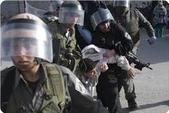
Israeli occupation forces (IOF) set up a roadblock in the vicinity of a secondary school for boys in Yabad village, south of Jenin, on Tuesday morning. Local sources said that the soldiers were provoking students and obstructing movement of civilians.
They said that soldiers manning the barrier, at the main entrance to Yabad, were searching all passing vehicles and questioning citizens, which created a traffic jam.
Locals said that the soldiers detained a vehicle and ordered all its four passengers out and beat them up.
They said that soldiers manning the barrier, at the main entrance to Yabad, were searching all passing vehicles and questioning citizens, which created a traffic jam.
Locals said that the soldiers detained a vehicle and ordered all its four passengers out and beat them up.
25 mar 2013
Workers in Palestinian universities go on strike for two days

Workers in PA public universities announced they would go on strike on Tuesday and Wednesday after the government of Salam Fayyad failed to meet their demands.
Members of the workers union held a meeting on Sunday and decided to go ahead with the strike demanding implementation of their new scale of salaries and an increase of 30% of their allowance.
A spokesman for the union of workers in government universities said that the strike would continue weekly until their allowance is endorsed and until they receive equal salaries to their colleagues in private universities.
Members of the workers union held a meeting on Sunday and decided to go ahead with the strike demanding implementation of their new scale of salaries and an increase of 30% of their allowance.
A spokesman for the union of workers in government universities said that the strike would continue weekly until their allowance is endorsed and until they receive equal salaries to their colleagues in private universities.
20 mar 2013
Israeli Soldiers Beat School Students in Hebron

Israeli soldiers Wednesday beat up and kicked many school students in the Israeli-controlled old city of Hebron causing bruises to many, according to witnesses.
They said the soldiers held the students, ranging in age between 8 and 17 years, and who were on their way to school in the morning and assaulted them without any apparent reason other than because stones were thrown at them.
They warned teachers and the school principal to prevent the students from throwing rocks.
They said the soldiers held the students, ranging in age between 8 and 17 years, and who were on their way to school in the morning and assaulted them without any apparent reason other than because stones were thrown at them.
They warned teachers and the school principal to prevent the students from throwing rocks.
IOF soldiers detain 50 schoolchildren in Al-Khalil, obstruct traffic near Jenin
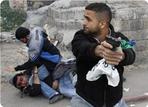
Israeli occupation forces (IOF) detained 50 Palestinian schoolchildren in the Old City of Al-Khalil on Wednesday morning. Eyewitnesses told the PIC that IOF soldiers installed a roadblock in the middle of a street that leads to several schools in the southern areas of the Old City.
They said that the soldiers searched bags of all passing students and took away 50 of them from the elementary, intermediate and secondary stages from a number of schools including UNRWA-run ones.
The witnesses pointed out that none of the 50 students was released from the military position they were taken to.
Meanwhile, IOF soldiers blocked traffic at the entrance to Yabad village, south of Jenin, on Wednesday morning, locals said.
They said that the soldiers detained scores of vehicles, searched them, and asked for IDs of all those boarding them, creating traffic congestion in the process and delaying arrival of employees to their workplaces.
They said that the soldiers searched bags of all passing students and took away 50 of them from the elementary, intermediate and secondary stages from a number of schools including UNRWA-run ones.
The witnesses pointed out that none of the 50 students was released from the military position they were taken to.
Meanwhile, IOF soldiers blocked traffic at the entrance to Yabad village, south of Jenin, on Wednesday morning, locals said.
They said that the soldiers detained scores of vehicles, searched them, and asked for IDs of all those boarding them, creating traffic congestion in the process and delaying arrival of employees to their workplaces.
16 mar 2013
Adalah: Israel denies Palestinian kids in its jails access to education
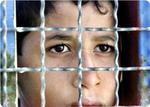
The legal center of Arab minority rights Adalah demanded in a joint letter with defense for children international (DCI) the Israeli prison authority to grant Palestinian children and minors access to schooling in its jails. The center pointed out that there are about 400 prisoners aged between 12 and 16 years serving very long terms in the prisons of Magiddo, Hasharon and Ofer.
2013 saw a dangerous turn in Israel's suppression of Palestinian children, where 700 arrest incidents have been documented since the start of the year against children, most of them took part in protests against the occupation.
Israel's detention of children is aimed at intimidating them into ending their participation in popular events against its policies and violations in the occupied Palestinian territories.
Adalah lawyer Rima Ayoub said that depriving the Palestinian children in prison of education is contrary to court verdicts issued by Israel in this regard and violates the international law that protects their right to education.
Ayoub stressed that Israel discriminately and deliberately deprives the Palestinian children of education, while it provides Israeli children, who are jailed for criminal reasons, with their educational rights in prison.
2013 saw a dangerous turn in Israel's suppression of Palestinian children, where 700 arrest incidents have been documented since the start of the year against children, most of them took part in protests against the occupation.
Israel's detention of children is aimed at intimidating them into ending their participation in popular events against its policies and violations in the occupied Palestinian territories.
Adalah lawyer Rima Ayoub said that depriving the Palestinian children in prison of education is contrary to court verdicts issued by Israel in this regard and violates the international law that protects their right to education.
Ayoub stressed that Israel discriminately and deliberately deprives the Palestinian children of education, while it provides Israeli children, who are jailed for criminal reasons, with their educational rights in prison.
12 mar 2013
15 Families Ordered Out Of Their Residence, Lands, Near Hebron
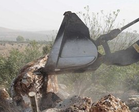
The Israeli army handed 15 Palestinian families living in Al-Janoub area, east if Sair town in the southern West Bank district of Hebron, military warrants ordering them to leave their homes and lands.
The army cited “military considerations” to its new decision that is similar to dozens of orders issued by the army in the area.
The fifteen families are facing eviction and displacement due to the Israeli decision, the Maan News agency has reported.
Maan quoted resident ‘Abed Shalalda stating that fifteen families, including his own, were ordered out of the area, and were told that the army will resort to violence “should they fail to comply”.
The families in this area live in tents; some even live in caves and ancient structures, as the Israeli military and the Israeli Civil Administration Office operating in the occupied West Bank do not recognize their residency rights.
Shalalda said that the families have deeds proving ownership of the land, but the army is not recognizing these documents.
Bedouin tribes in Hebron, as well as in different parts of the West Bank, and in the Negev desert are subject to ongoing violations and attacks carried out by the Israeli Authorities,
Over the weekend a group of fundamentalist Israeli settlers assaulted three Palestinian schoolchildren in Jaba’ village, north of occupied East Jerusalem. The three are brothers; this is the second attack against them since Thursday.
Mahmoud Abu Ghaya, a resident of the Al-Jahaleen Bedouin village, stated that the setters attacked three schoolchildren while walking to school inflicting various injuries.
In 2005, Israel approved the so-called “Negev Development Plan” aiming at building shopping centers and tourist areas, but at the same time displacing around some 65.000 Bedouins living in what Israel refers to as “unrecognized villages”.
Al-Araqeeb village in the Negev is one of the most impacted “unrecognized villages” as it was destroyed more than 41 times.
The “Prawer plan” calls for annexing more than 700.000 Dunams (185329 acres) and displacing the residents by demolishing 14 villages in the area.
All unrecognized villages in the Negev are under continuing Israeli attacks and violations, as Tel Aviv does not recognize the residents' right to live on their land -- land they inhabited long before the 1948 creation of the state of Israel in historic Palestine.
Unrecognized villages in the Negev are under continuing Israeli attacks and violations, as Tel Aviv does not recognize the residents' right to live on their land -- land they inhabited long before the 1948 creation of the state of Israel in historic Palestine.
The army cited “military considerations” to its new decision that is similar to dozens of orders issued by the army in the area.
The fifteen families are facing eviction and displacement due to the Israeli decision, the Maan News agency has reported.
Maan quoted resident ‘Abed Shalalda stating that fifteen families, including his own, were ordered out of the area, and were told that the army will resort to violence “should they fail to comply”.
The families in this area live in tents; some even live in caves and ancient structures, as the Israeli military and the Israeli Civil Administration Office operating in the occupied West Bank do not recognize their residency rights.
Shalalda said that the families have deeds proving ownership of the land, but the army is not recognizing these documents.
Bedouin tribes in Hebron, as well as in different parts of the West Bank, and in the Negev desert are subject to ongoing violations and attacks carried out by the Israeli Authorities,
Over the weekend a group of fundamentalist Israeli settlers assaulted three Palestinian schoolchildren in Jaba’ village, north of occupied East Jerusalem. The three are brothers; this is the second attack against them since Thursday.
Mahmoud Abu Ghaya, a resident of the Al-Jahaleen Bedouin village, stated that the setters attacked three schoolchildren while walking to school inflicting various injuries.
In 2005, Israel approved the so-called “Negev Development Plan” aiming at building shopping centers and tourist areas, but at the same time displacing around some 65.000 Bedouins living in what Israel refers to as “unrecognized villages”.
Al-Araqeeb village in the Negev is one of the most impacted “unrecognized villages” as it was destroyed more than 41 times.
The “Prawer plan” calls for annexing more than 700.000 Dunams (185329 acres) and displacing the residents by demolishing 14 villages in the area.
All unrecognized villages in the Negev are under continuing Israeli attacks and violations, as Tel Aviv does not recognize the residents' right to live on their land -- land they inhabited long before the 1948 creation of the state of Israel in historic Palestine.
Unrecognized villages in the Negev are under continuing Israeli attacks and violations, as Tel Aviv does not recognize the residents' right to live on their land -- land they inhabited long before the 1948 creation of the state of Israel in historic Palestine.
11 mar 2013
Israeli intelligence questions Palestinian student about studying chemistry
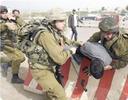
Israeli intelligence questioned a Palestinian student from Jenin after summoning him to Hawara army camp on reasons for studying chemistry.
Israeli occupation forces had stormed the home of 20-year-old student Mohammed Mahamid in Teiba village, west of Jenin, a few days ago and served him with a summons for intelligence interrogation.
Local sources told the PIC that an Israeli intelligence officer introduced himself as the one responsible for Najah university and questioned Mahamid on reasons for studying chemistry.
Mahamid expressed dismay at questioning him over his line of study at a time he does not pursue any political activity or join any faction.
Israeli occupation forces had stormed the home of 20-year-old student Mohammed Mahamid in Teiba village, west of Jenin, a few days ago and served him with a summons for intelligence interrogation.
Local sources told the PIC that an Israeli intelligence officer introduced himself as the one responsible for Najah university and questioned Mahamid on reasons for studying chemistry.
Mahamid expressed dismay at questioning him over his line of study at a time he does not pursue any political activity or join any faction.
27 feb 2013
Clashes erupt between citizens and Israeli forces in Jenin and al-Khalil
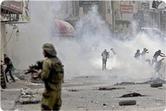
Clashes broke out this afternoon in the town of Yamoun western Jenin after the Israeli occupation forces stormed a house in the town. Local sources said that the occupation forces raided and searched the house of the citizen Rizk Hamdiya, 50, in the town of Yamoun then questioned its inhabitants, which led to the outbreak of confrontations.
The sources pointed out that the occupation forces fired bullets and started provoking the school students and youths who responded by throwing stones and empty bottles at the soldiers. No injuries were reported.
Eyewitnesses stated that the Israeli occupation soldiers were deployed in the al-Wedyan area in the town and at the crossroad in the Jenin-Haifa Street, began searching the vehicles.
Meanwhile, local sources in the southern West Bank city of al-Khalil said that clashes broke out between the students and the occupation soldiers in the Masharqa area in the vicinity of Tariq ibn Ziyad School, near the Ibrahimi Mosque.
The Israeli soldiers fired poisonous gas and stun and tear gas grenades at the citizens and the school children, causing a number of them to suffocate. The wounded were treated on field by the Red Crescent paramedics.
The sources pointed out that the occupation forces fired bullets and started provoking the school students and youths who responded by throwing stones and empty bottles at the soldiers. No injuries were reported.
Eyewitnesses stated that the Israeli occupation soldiers were deployed in the al-Wedyan area in the town and at the crossroad in the Jenin-Haifa Street, began searching the vehicles.
Meanwhile, local sources in the southern West Bank city of al-Khalil said that clashes broke out between the students and the occupation soldiers in the Masharqa area in the vicinity of Tariq ibn Ziyad School, near the Ibrahimi Mosque.
The Israeli soldiers fired poisonous gas and stun and tear gas grenades at the citizens and the school children, causing a number of them to suffocate. The wounded were treated on field by the Red Crescent paramedics.
Palestinian patient prisoner’s family appeals to save his life
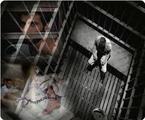
The family of the prisoner Fuad Akram Hamdiye, 44 from the city of Jerusalem, has appealed through Ahrar center for prisoners’ studies and human rights for the release of its son, who suffers impaired mobility and paralysis in one of his arms.
Fuad Al-Khuffash, the director of Ahrar center, said that prisoner Fuad Hamdiye, was arrested from the school where he works in on the 23rd of October, 2011. The occupation forces assaulted and handcuffed him in front of his students and colleagues at the school.
Um Mohammed, the mother of prisoner Fuad Hamdiye, confirmed to Ahrar center that her son has paralysis in his left hand, since he was a child.
“The Israeli forces don’t care about Fouad’s health conditions or the paralysis in his hand and they arrested him claiming that he is a dangerous person”, she added.
Um Mohammed said that her son was preparing for his Masters degree and was near to finish his Master dissertation, but the occupation stole all his papers.
She stated that: “Fuad teaches the prisoners inside the jail and gives lessons to the students of high school. He doesn’t waste time in prison and helps the captives there.
Prisoner Fuad Hamdiye, a father of three children, has been held in Beersheba prison, where he has been waiting for his trial suspended since 2011.
Fuad Al-Khuffash, the director of Ahrar center, said that prisoner Fuad Hamdiye, was arrested from the school where he works in on the 23rd of October, 2011. The occupation forces assaulted and handcuffed him in front of his students and colleagues at the school.
Um Mohammed, the mother of prisoner Fuad Hamdiye, confirmed to Ahrar center that her son has paralysis in his left hand, since he was a child.
“The Israeli forces don’t care about Fouad’s health conditions or the paralysis in his hand and they arrested him claiming that he is a dangerous person”, she added.
Um Mohammed said that her son was preparing for his Masters degree and was near to finish his Master dissertation, but the occupation stole all his papers.
She stated that: “Fuad teaches the prisoners inside the jail and gives lessons to the students of high school. He doesn’t waste time in prison and helps the captives there.
Prisoner Fuad Hamdiye, a father of three children, has been held in Beersheba prison, where he has been waiting for his trial suspended since 2011.
IOF soldiers try to storm Silwan school

Israeli occupation forces (IOF) tried to storm Silwan intermediate school for boys in Ras Al-Amud suburb on Wednesday morning. Issam Al-Abbasi, the secretary of the school’s parents council, said in a press statement that the school administration refused to allow the soldiers, who barged into its yard in big numbers, to enter the buildings.
He said that 1000 students study in the school in the seventh to the ninth grade.
He urged human rights groups to intervene and prevent the repeated storming of schools at the hands of those forces.
Abbasi said that undercover agents and soldiers routinely attack students while on their way to school in Silwan, noting that a teacher was arrested last year for trying to prevent soldiers from arresting a student.
He said that 1000 students study in the school in the seventh to the ninth grade.
He urged human rights groups to intervene and prevent the repeated storming of schools at the hands of those forces.
Abbasi said that undercover agents and soldiers routinely attack students while on their way to school in Silwan, noting that a teacher was arrested last year for trying to prevent soldiers from arresting a student.
26 feb 2013
IOF soldiers storm school, arrest 18 students
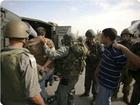
Israeli occupation forces (IOF) stormed a secondary school in Til village, Nablus province, and arrested 18 students who were playing football in the school’s playground on Tuesday morning.
The Ahrar center for prisoners’ studies and human rights quoted an eyewitness as saying that the soldiers burst into the school and detained all those in the playground who were in the age category 17-19 years old.
The eyewitness said that the soldiers did not allow the youngsters to wear their ordinary clothes and took them away in the light sports clothes in such a cold weather.
Fuad Al-Khafsh, the center’s director, denounced the unjustified act and demanded immediate action to save the students. The school kids are reportedly held in the Hawara army camp to the south of Nablus.
The Ahrar center for prisoners’ studies and human rights quoted an eyewitness as saying that the soldiers burst into the school and detained all those in the playground who were in the age category 17-19 years old.
The eyewitness said that the soldiers did not allow the youngsters to wear their ordinary clothes and took them away in the light sports clothes in such a cold weather.
Fuad Al-Khafsh, the center’s director, denounced the unjustified act and demanded immediate action to save the students. The school kids are reportedly held in the Hawara army camp to the south of Nablus.
7 feb 2013
IOF soldiers arrest youth, break into elementary school
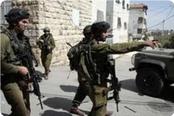
Israeli occupation forces (IOF) manning the Hamra roadblock in the northern Jordan Valley arrested a Palestinian young man at dawn Thursday. Local sources said that the soldiers detained Suleiman Mohammed, 19, at the roadblock while heading from his hometown of Tobas to his work in the Jordan Valley.
Other IOF soldiers stormed Erka village to the west of Jenin at dawn Thursday and questioned citizens who were going for dawn prayers.
IOF soldiers had burst into an elementary school west of Ramallah on Wednesday and threatened to beat students and teachers and called them bad names, Palestinian sources said.
Other IOF soldiers stormed Erka village to the west of Jenin at dawn Thursday and questioned citizens who were going for dawn prayers.
IOF soldiers had burst into an elementary school west of Ramallah on Wednesday and threatened to beat students and teachers and called them bad names, Palestinian sources said.
31 jan 2013
Hamas Teaches the "Enemy Language" of Hebrew in Gaza Schools

Islamist Hamas authorities plan to expand Hebrew-language classes in the Gaza Strip's high schools to help Palestinians know their enemy in times of conflict with Israel.
Far from a sign that peace will soon break out, Hamas's promotion of Hebrew learning in the Israeli-blockaded Mediterranean enclave aims to make linguistic skill a useful new front in the struggle against the Jewish state.
Hamas rejects Israel's existence and seeks to supplant it with a Palestinian state, but says Gazans stand to gain from being able to monitor the discourse of a militarily vastly superior adversary in its own language.
Hamas aired threatening video and radio messages to Israelis in Hebrew during eight days of clashes in November in which militants peppered the Jewish state with rocket salvoes before Egypt brokered a ceasefire. Hamas's Hebrew broadcasts underlined a desire to use Hebrew as a propaganda tool in the conflict.
The Ezzedine al-Qassam Brigades, Hamas's armed wing, have even begun issuing statements in Hebrew via its Twitter account.
Soumaya al-Nakhala, a senior Hamas education ministry official, told Reuters that knowing one's enemy is consistent with the teachings of the Prophet Mohammed.
"Expanding (Hebrew) teaching comes as a result of our plan and meeting greater demand by students to learn Hebrew. They want to learn the language of their enemy so they can avoid their tricks and evil," al-Nakhala said.
She was alluding to acquiring a grasp of Israel's politics, policy and strategy towards Palestinians by following its famously vibrant print and electronic media.
Hebrew classes are now limited to ninth-grade students, but will expand to higher grades starting next semester, she said.
LINGUISTIC ISOLATION
Twenty years ago, many of Gaza's 1.5 million Palestinians could speak and understand Hebrew from having worked in the Jewish state or spending time in prison there for alleged involvement in militant attacks.
But Gaza has been largely isolated from Israel since 1994, when it gained limited self-rule through interim peace deals and Israel shut its gates to most Gazan laborers, citing security threats and mounting cross-border violence.
Today, only about 50,000 Gazans - often former laborers and prisoners in Israel - retain a grasp of Hebrew.
Younger adults generally can speak only Arabic despite living next door to Israel and using its shekel currency.
"We chose to learn Hebrew because we felt it was an interesting language, and also because when you learn your enemy's language you also learn how to avoid their evil," said 14-year-old student Mohammed Seyam.
About 750 students are already studying Hebrew as part of a pilot project in Gaza, Hamas officials said, and the pro-Hamas Islamic University has launched a faculty of Hebrew studies.
"This is a trial program and we hope next year to expand the number of students learning Hebrew," Wafa Mqat, headmaster of a Gaza City school conducting the pilot course.
Khaled Al-Baba, among a number of teachers who picked up Hebrew during Israel's occupation of Gaza from 1967 until 2005, said many pupils now preferred to study Hebrew over previous favorite French.
In his classroom one day, Baba fired questions at his pupils in Hebrew and some boasted they already knew the language well enough to decipher instructions on Israeli-made products sold at Gaza supermarkets and follow Israeli media.
Hebrew is not a part of the school curriculum in the West Bank, where the Western-backed Palestinian Authority exercises self-rule in areas not occupied by Israeli settlers and has already recognized the Jewish state.
The Israeli armed forces and security services have many officers with a strong command of Arabic, particularly intelligence officers who interrogate Palestinian detainees.
Far from a sign that peace will soon break out, Hamas's promotion of Hebrew learning in the Israeli-blockaded Mediterranean enclave aims to make linguistic skill a useful new front in the struggle against the Jewish state.
Hamas rejects Israel's existence and seeks to supplant it with a Palestinian state, but says Gazans stand to gain from being able to monitor the discourse of a militarily vastly superior adversary in its own language.
Hamas aired threatening video and radio messages to Israelis in Hebrew during eight days of clashes in November in which militants peppered the Jewish state with rocket salvoes before Egypt brokered a ceasefire. Hamas's Hebrew broadcasts underlined a desire to use Hebrew as a propaganda tool in the conflict.
The Ezzedine al-Qassam Brigades, Hamas's armed wing, have even begun issuing statements in Hebrew via its Twitter account.
Soumaya al-Nakhala, a senior Hamas education ministry official, told Reuters that knowing one's enemy is consistent with the teachings of the Prophet Mohammed.
"Expanding (Hebrew) teaching comes as a result of our plan and meeting greater demand by students to learn Hebrew. They want to learn the language of their enemy so they can avoid their tricks and evil," al-Nakhala said.
She was alluding to acquiring a grasp of Israel's politics, policy and strategy towards Palestinians by following its famously vibrant print and electronic media.
Hebrew classes are now limited to ninth-grade students, but will expand to higher grades starting next semester, she said.
LINGUISTIC ISOLATION
Twenty years ago, many of Gaza's 1.5 million Palestinians could speak and understand Hebrew from having worked in the Jewish state or spending time in prison there for alleged involvement in militant attacks.
But Gaza has been largely isolated from Israel since 1994, when it gained limited self-rule through interim peace deals and Israel shut its gates to most Gazan laborers, citing security threats and mounting cross-border violence.
Today, only about 50,000 Gazans - often former laborers and prisoners in Israel - retain a grasp of Hebrew.
Younger adults generally can speak only Arabic despite living next door to Israel and using its shekel currency.
"We chose to learn Hebrew because we felt it was an interesting language, and also because when you learn your enemy's language you also learn how to avoid their evil," said 14-year-old student Mohammed Seyam.
About 750 students are already studying Hebrew as part of a pilot project in Gaza, Hamas officials said, and the pro-Hamas Islamic University has launched a faculty of Hebrew studies.
"This is a trial program and we hope next year to expand the number of students learning Hebrew," Wafa Mqat, headmaster of a Gaza City school conducting the pilot course.
Khaled Al-Baba, among a number of teachers who picked up Hebrew during Israel's occupation of Gaza from 1967 until 2005, said many pupils now preferred to study Hebrew over previous favorite French.
In his classroom one day, Baba fired questions at his pupils in Hebrew and some boasted they already knew the language well enough to decipher instructions on Israeli-made products sold at Gaza supermarkets and follow Israeli media.
Hebrew is not a part of the school curriculum in the West Bank, where the Western-backed Palestinian Authority exercises self-rule in areas not occupied by Israeli settlers and has already recognized the Jewish state.
The Israeli armed forces and security services have many officers with a strong command of Arabic, particularly intelligence officers who interrogate Palestinian detainees.
26 jan 2013
Teachers to launch strike action this week, union says

Teachers in the West Bank will go on strike for three days this week, the teachers union announced Saturday.
Ahmed Anis, secretary general of the teachers union, told Ma'an that there will be no classes in West Bank schools on Sunday, Monday and Tuesday, as teachers protest against irregular salary payments by the Palestinian Authority.
Anis called on the PA to respond to teachers' demands before Feb. 5, which was the deadline set by the union to reach an agreement over salaries.
If no agreement is made before the due date, the union will escalate strike action to unprecedented levels, he said, adding that classes will be resumed on Wednesday until Feb. 5.
Ahmed Anis, secretary general of the teachers union, told Ma'an that there will be no classes in West Bank schools on Sunday, Monday and Tuesday, as teachers protest against irregular salary payments by the Palestinian Authority.
Anis called on the PA to respond to teachers' demands before Feb. 5, which was the deadline set by the union to reach an agreement over salaries.
If no agreement is made before the due date, the union will escalate strike action to unprecedented levels, he said, adding that classes will be resumed on Wednesday until Feb. 5.
8 jan 2013
Schools called off in West Bank due to extreme weather conditions

The ministry of education in the West Bank has called off school classes for preliminary stages on Tuesday and Wednesday due to extreme weather conditions.
Dr. Mohammed Abu Zeid, the education undersecretary, announced on Monday that all schools for kindergartens and up to fourth grade would be closed in the next two days.
He said that classes in all stages would be called off on Wednesday due to an expected snowfall.
Dr. Mohammed Abu Zeid, the education undersecretary, announced on Monday that all schools for kindergartens and up to fourth grade would be closed in the next two days.
He said that classes in all stages would be called off on Wednesday due to an expected snowfall.
7 jan 2013
Egyptian advisor Shorbaji praises Islamic university for its high standards
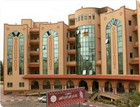
A high-level Egyptian delegation hailed the Islamic university for the scientific achievements it has made and its success in providing high educational standards despite the Israeli blockade and aggression.
The delegation arrived in Gaza on Sunday led by advisor to the Egyptian president for the Sinai affairs Abdul-Rahman Al-Shorbaji.
During his visit to the Islamic university, Shorbaji expressed his admiration for the excellence and the progress that have been achieved by the university at the academic, social and scientific levels.
For his part, head of Khayraat foundation for humanitarian communication said he was proud to see a high level of dedication and proficiency inside the university, and called on the Egyptian universities to take advantage of the academic experience of the Islamic university.
Member of the freedom and justice party Raja Abdul-Salam, in turn, saluted the university for supporting the education of women and promoting their role in the progress of the Palestinian society.
The delegation arrived in Gaza on Sunday led by advisor to the Egyptian president for the Sinai affairs Abdul-Rahman Al-Shorbaji.
During his visit to the Islamic university, Shorbaji expressed his admiration for the excellence and the progress that have been achieved by the university at the academic, social and scientific levels.
For his part, head of Khayraat foundation for humanitarian communication said he was proud to see a high level of dedication and proficiency inside the university, and called on the Egyptian universities to take advantage of the academic experience of the Islamic university.
Member of the freedom and justice party Raja Abdul-Salam, in turn, saluted the university for supporting the education of women and promoting their role in the progress of the Palestinian society.
Page: 2 - 1
